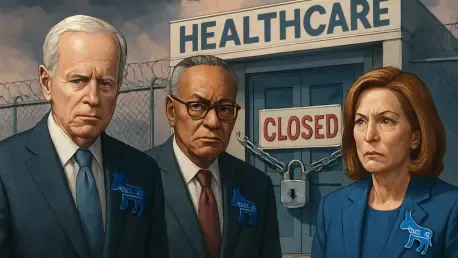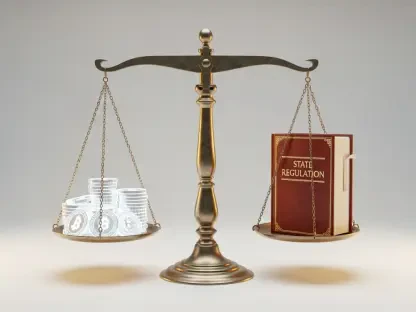As the threat of a government shutdown looms, I’m thrilled to sit down with Donald Gainsborough, a political savant and the leader of Government Curated, whose deep expertise in policy and legislation offers unparalleled insight into the current standoff in Congress. Today, we’re diving into the Democrats’ hardball strategy on the upcoming funding fight, their push for health care protections, and the broader implications of this high-stakes negotiation. From the expiring Affordable Care Act subsidies to changes in Medicare and the dynamics of bipartisan compromise, Donald unpacks the critical issues shaping this battle on Capitol Hill.
Can you walk us through why Democrats are taking such a firm stance by threatening to withhold votes on the stopgap spending bill?
Absolutely, Ethan. Democrats are digging in because they see this as a critical moment to protect health care benefits for millions of Americans. With the government shutdown deadline just weeks away on September 30, they’re leveraging their essential votes in the Senate to force Republicans to the table on issues like expiring subsidies under the Affordable Care Act. It’s a high-risk strategy, but they believe that without this pressure, health care cuts will slip through unchecked.
What specific health care priorities are Democrats emphasizing in these negotiations?
Their focus is twofold. First, they’re zeroing in on the enhanced subsidies for about 22 million people under the Affordable Care Act, which are set to expire at the end of 2025. These subsidies, beefed up since 2021, are a lifeline for many. Second, they’re alarmed by changes to Medicare from recent legislation, which could strip access to care for around 10 million people over the next decade. For Democrats, these aren’t just numbers—they’re people’s lives on the line.
How are Democrats planning to use their leverage in the Senate to push for these demands?
In the Senate, where a stopgap bill needs 60 votes to pass, Democrats hold significant sway as the minority party. They’re essentially saying, ‘No deal on funding without a deal on health care.’ By withholding their support, they’re forcing Republicans to negotiate on a bipartisan basis rather than pushing through a bill that ignores these pressing issues. It’s a calculated move to shift the conversation and ensure their priorities aren’t sidelined.
House Minority Leader Hakeem Jeffries has rejected supporting a ‘partisan spending agreement.’ Can you explain what he means by that?
Jeffries is drawing a line against any funding bill that reflects only Republican priorities without meaningful input from Democrats. A ‘partisan agreement’ in this context would be a measure that funds the government but disregards Democratic concerns, especially on health care. He’s signaling that Democrats won’t be steamrolled and are demanding a seat at the table for a balanced outcome.
From the Democrats’ perspective, what would a fair compromise look like in these funding talks?
A fair compromise for Democrats would likely involve extending the Affordable Care Act subsidies and addressing the Medicare changes within the funding framework—or at least securing a firm commitment to tackle these soon. They’d want assurances that any stopgap bill doesn’t just kick the can down the road on health care while funding other priorities. It’s about ensuring that the needs of millions aren’t sacrificed for political expediency.
Senate Minority Leader Chuck Schumer has emphasized a united front with Jeffries. What does this solidarity between House and Senate Democrats mean for the negotiations?
This unity is a powerful signal. When House and Senate Democrats speak with one voice, it amplifies their leverage and shows Republicans they’re facing a coordinated opposition. It means there’s less room for the majority to exploit divisions or pick off individual members. This alignment strengthens their bargaining position, especially in a tight timeline where every vote counts.
How significant is this unity for the Democrats’ strategy right now?
It’s absolutely crucial. With the shutdown clock ticking, any sign of fracture could weaken their stance and give Republicans an opening to push a less favorable bill. Unity ensures they maintain pressure and keep health care at the forefront. It also reassures their base that they’re fighting as a team for shared values, which is vital for political momentum.
Let’s dive into the Affordable Care Act subsidies expiring at the end of 2025. Can you paint a picture of what’s at stake for those affected?
Certainly. These enhanced subsidies help about 22 million Americans afford health insurance through the ACA marketplace. If they expire, many could face skyrocketing premiums or be forced to drop coverage altogether. For families already stretched thin, this could mean losing access to basic medical care, delaying treatments, or facing financial ruin from unexpected health costs. It’s a looming crisis that Congress can’t afford to ignore.
Democrats are also pushing back on Medicare changes tied to recent legislation. What exactly are these changes, and why are they so concerning?
The changes stem from the One Big Beautiful Bill Act, which, according to the Congressional Budget Office, could result in 10 million people losing access to Medicare coverage over the next decade. While the specifics vary, they often involve adjustments to eligibility or benefits that critics say erode protections. Democrats see this as a direct attack on a program that’s a cornerstone for seniors and vulnerable populations, making it a non-negotiable issue in these talks.
Some Republicans suggest handling health care subsidies separately from the funding bill. What’s your perspective on splitting these issues?
Separating health care from the funding bill sounds reasonable on the surface, but it risks delaying or derailing action altogether. When issues get pushed to a ‘later’ discussion, they often lose urgency and political will. Democrats worry this is a tactic to sidestep accountability on subsidies while securing funding for other priorities. It’s a gamble that could leave millions in limbo, and I think Democrats are right to be skeptical.
What is your forecast for how this shutdown fight will play out over the next few weeks?
I think we’re in for a tense few weeks. If Republicans hold firm on a partisan bill, we could edge closer to a shutdown, though I suspect both sides will ultimately find some middle ground—likely a short-term extension with vague promises on health care. The wildcard is whether Democrats can sustain their unity under pressure and if public opinion sways enough to force Republican concessions. It’s going to be a nail-biter right up to the deadline.









